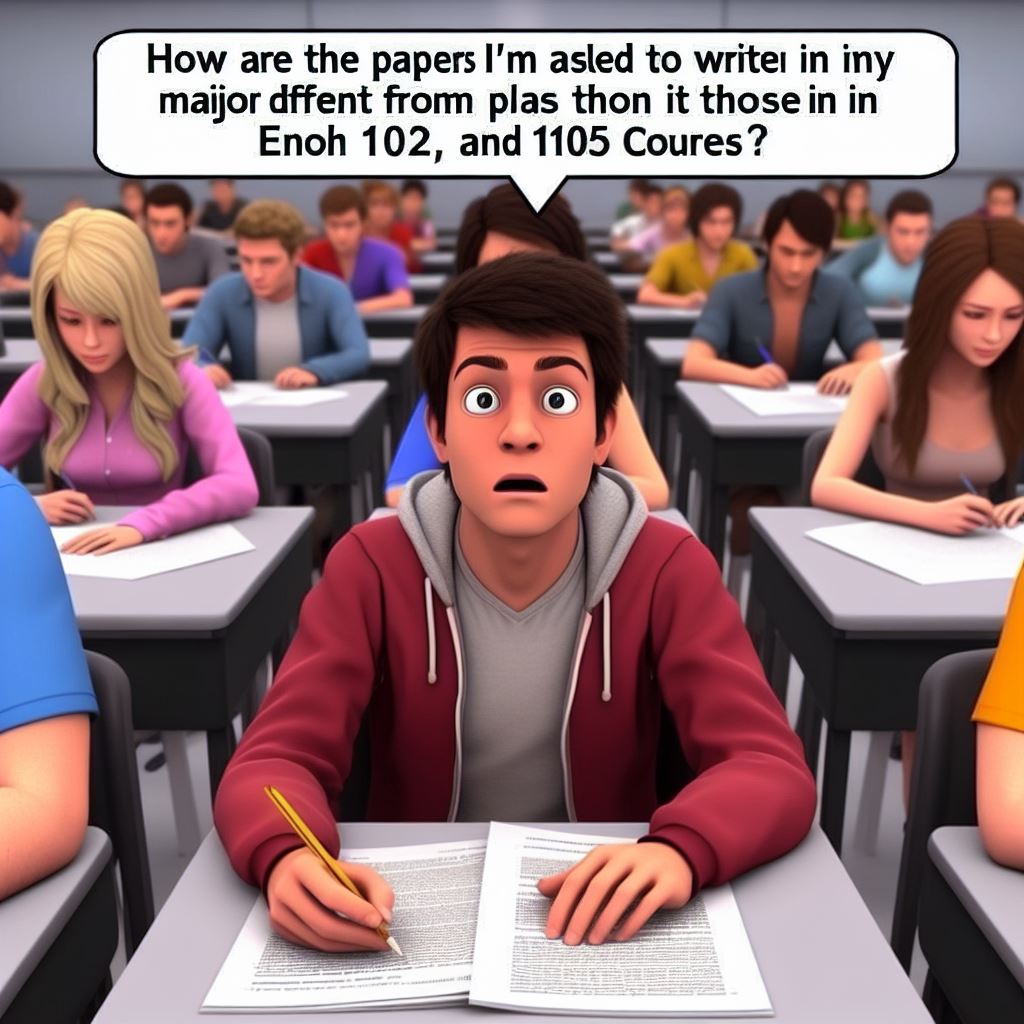How are the papers I’m asked to write in my major different from those in English 101, 102, and 105 courses?
Writing styles in college differ across disciplines because each field has its own conventions and specific requirements. For instance, disciplines like Sociology, Biology, History, or Economics have distinct writing conventions tailored to effectively communicate within that particular academic field. These conventions encompass vocabulary, structure, citation styles, and even the way arguments are presented.

In disciplines like Sociology, writing conventions are purposefully established to assist writers in addressing subject matters pertinent to that field. For example, in a Sociology essay, the usage of specific terminology and structural formats is intentional, aimed at enabling writers to articulate sociological concepts, theories, and research findings effectively. This isn’t arbitrary; rather, it’s a deliberate means to ensure that writing in Sociology adheres to the standards and expectations set within that discipline.
Understanding these discipline-specific conventions is crucial as it enables students to navigate and adapt their writing styles according to the expectations of each academic field. This transition from general English classes to subject-specific writing requires an awareness and application of the unique writing norms within various disciplines.
Transitioning from general English classes to subject-specific writing in college requires students to grasp and adapt to various writing conventions across disciplines. Here’s a detailed explanation of the provided advice:
Seek Guidance from Professors
Engaging with professors during their designated office hours is a strategic move for students aiming to establish a meaningful connection with their instructors. This direct interaction provides a platform for seeking comprehensive clarity on assignment expectations, discussing uncertainties, and acquiring detailed guidance on the distinct writing requisites across diverse academic disciplines. Through these discussions, students gain invaluable insights into the nuanced expectations and specific writing styles of each subject, allowing them to align their work more effectively with the standards expected in various disciplines.
Moreover, these interactions offer students an opportunity to deepen their comprehension of the unique conventions and requirements of different academic fields. By engaging in direct conversations with professors, students can refine their understanding of vocabulary usage, grammatical structures, citation preferences, and evidence utilization specific to each subject. This knowledge aids in tailoring their writing approaches to meet the distinctive criteria and expectations set forth by each discipline, ensuring a more refined and accurate alignment of their work within different academic contexts.
Additionally, utilizing professors’ guidance during office hours fosters an environment conducive to constructive feedback and clarifications. This direct access allows students to seek advice on refining their writing techniques, understanding the nuances of disciplinary-specific language, and refining their interpretations of the assigned topics. These interactions serve as catalysts for enhancing students’ confidence in adapting their writing styles effectively across various academic disciplines.
Variations Across Disciplines:
Understanding that different fields demand distinct writing styles is essential. For instance, an Anthropology paper might necessitate a different approach than a Biology paper, showcasing variations in:
- Vocabulary: Every academic field possesses its own lexicon, specific to its subject matter. For instance, in Sociology, terms like “social stratification” or “cultural relativism” hold particular significance. Biology might use terminology such as “mitosis” or “allele frequency.” Understanding and employing these discipline-specific terms is essential for clarity and precision in writing.
- Grammar and Punctuation: Writing conventions, such as whether to use first or third person, or whether to employ an active or passive voice, can differ. For instance, while a Biology paper might favor a passive voice for objectivity, a Sociology essay might encourage an active voice for directness.
- Citation Styles: Various academic disciplines adhere to different citation styles, like MLA (Modern Language Association), APA (American Psychological Association), or Chicago. Each style governs how sources are cited, referenced, and formatted in academic writing. Additionally, disciplines might have preferences regarding direct quoting versus paraphrasing to support arguments.
- Evidence Utilization: Different fields rely on diverse forms of evidence to substantiate claims. For example, History papers often lean on empirical data and historical research, while Philosophy might prioritize logical reasoning or theoretical constructs. The type of evidence expected often aligns with the methodologies and conventions inherent in each discipline.
Study Examples:
Exploring scholarly works authored by esteemed professors within your major provides invaluable insights into the typical writing styles and academic projects characteristic of that specific field. Delving into these resources offers an opportunity to grasp the prevalent expectations, conventions, and methodologies inherent to the discipline. By immersing oneself in these academic works, students gain a nuanced understanding of the writing standards and the scholarly discourse that shape the domain.
Such engagement with scholarly texts fosters a comprehensive view of the field’s accepted practices, allowing students to assimilate the academic language, research methodologies, and critical analysis prevalent within their discipline. It serves as a foundational step in learning the nuances of academic writing specific to their major, enabling them to align their own writing endeavors with the established norms and scholarly expectations.
This immersive approach not only aids in familiarizing students with the language and structure commonly used in the field but also enhances their ability to critically evaluate, interpret, and respond to scholarly works effectively. It cultivates an essential skill set necessary for success in academic writing, empowering students to navigate the expectations and conventions prevalent in their chosen area of study.
English Classes as Foundations:
English courses like 101, 102, and/or 105 serve as pivotal pillars for students, fostering essential skills in writing processes, rhetorical awareness, and critical thinking. These courses focus on key rhetorical concepts, such as understanding the audience, defining clear goals, and adeptly selecting evidence. By emphasizing these concepts, students gain fundamental knowledge crucial for flexibly adapting their writing styles and approaches to diverse academic contexts.
These foundational English classes play a crucial role in nurturing students’ adaptability and preparedness for the multifaceted demands of various disciplines. By equipping students with a comprehensive understanding of rhetorical strategies and critical thinking skills, these courses lay a robust groundwork. They empower students to navigate and excel in the specific writing requirements inherent in different academic fields they may encounter throughout their academic journey.
What can the Writing Center do to help?
At the Writing Center, our primary goal is to empower writers by providing tailored assistance and guidance throughout their writing journey. We kick off each session by thoroughly examining assignment details, ensuring a clear understanding of instructors’ expectations. Sometimes, writers approach us seeking clarity when assignment requirements aren’t explicit, and in those instances, we help decode prompts and frame questions for instructors. Once we’ve mapped out the assignment’s parameters, our focus shifts to addressing specific writer needs, be it refining thesis statements, improving structural coherence, or enhancing overall clarity.
Assignment Interpretation and Clarification
At the Writing Center, our primary objective is to ensure a thorough comprehension of the assignment’s intricacies and the specific expectations set by the instructors. Often, writers approach us when uncertainties loom regarding their instructors’ requirements. In such cases, we take the initiative to decode the assignment prompts, providing our interpretations to clarify any ambiguity. Through this collaborative process, we aid writers in formulating pertinent questions that they can later discuss with their instructors, ensuring a clearer understanding of the assignment’s objectives and expectations.
Our goal is to facilitate writers in navigating the assignment landscape with confidence. By offering interpretative assistance and aiding in the formulation of relevant queries, we enable writers to approach their instructors more confidently, ensuring a more precise alignment with the assignment’s goals and criteria.
Tailored Assistance
Once we comprehend the assignment’s intricacies, our focus narrows down to pinpointing the precise areas where the writer seeks guidance. Engaging in detailed discussions, we delve into individual writing challenges, whether they involve refining thesis statements, enhancing structural coherence, or improving overall articulation. This tailored approach allows us to offer specialized support that caters to the writer’s distinct requirements, aiding in their skill development and fostering improved writing proficiency.
Our aim is to provide personalized assistance that aligns with the writer’s unique goals and challenges. By identifying these specific needs, we tailor our guidance, offering strategies and tools that not only address immediate concerns but also equip writers with skills they can apply to elevate their writing across diverse contexts and assignments.
Strategy Development and Enhancement
At the Writing Center, our consultations are tailored to cater to writers’ specific needs. After dissecting the assignment details and understanding the writer’s objectives, we delve into a collaborative process. Together, we explore effective brainstorming methods, structuring approaches, drafting techniques, and revision tactics. This hands-on engagement aims not only to enhance the current piece but also to equip writers with a versatile skill set applicable across diverse writing contexts. Our focus extends beyond the immediate task, fostering skill development and empowering writers with adaptable strategies that bolster their writing proficiency over time.
Furthermore, our consultations are geared toward cultivating self-sufficiency in writers. We impart tools and methodologies that writers can readily apply beyond our sessions, ensuring they have a robust toolkit for future writing endeavors. Our ultimate aim is to instill confidence and competence, enabling writers to navigate various writing tasks with greater ease and proficiency.


